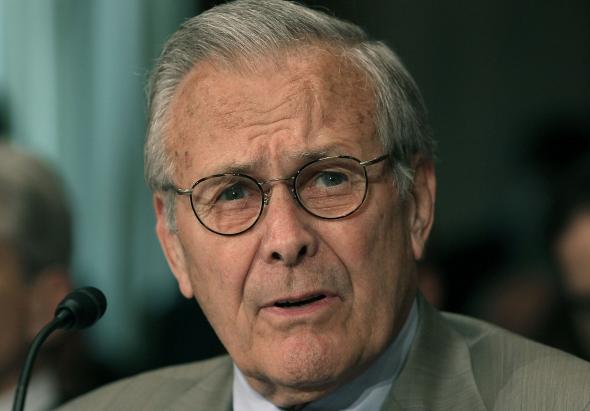A Patriotic Double Feature of The Unknown Known and Captain America: The Winter Soldier

Photo by Mark Wilson/Getty Images
Dana Stevens and I just recorded a Spoiler Special for The Unknown Known, Erroll Morris' long-awaited, critic-confounding documentary about Donald Rumsfeld. Off the clock, I went to see Captain America: The Winter Soldier, the latest blockbuster in the Marvel movie universe, and the one most likely to incite anger on Fox News followed by anger-at-the-anger on The Daily Show. It wasn't planned this way, but the two films went together like a white wine and fish pairing.
The Unknown Known comes to the screen with heavier expectations, of course, and an aura of Importance. Eleven years ago, as Americans began to turn on the postwar occupation of Iraq, Morris released the definitive interview with former Defense Secretary Robert McNamara. It wasn't McNamara's first on-screen apology—he had, as the movie shows, been making them for years—but it was indeliable and perfectly timed. He even went on tour to promote the movie. Morris won an Oscar, and used his 2004 acceptance speech to worry that America had fallen into another "rabbit hole."
Donald Rumsfeld was not paying attention. He watched The Fog of War only years later, after Morris approached him about sitting for a film of his own. Rumsfeld had retired under durress in 2006 and published his own memoirs five years later, accompanying them with online troves of old documents. Half a dozen other documentarians had approached him about telling his story, but Rumsfeld didn't want a hagiography. He wanted, and got, days of interviews (33 hours of tape) with a documentary-maker, and interviewer, respected as the absolute best at his craft. It quickly beccame evidence that Morris would not get another secretary of defense to apologize for what he'd done. Instead, he got a film about rhetoric and hubris, with a subject who is caught short only once, when he's presented with evidence that enhanced interrogation techniques did migrate from Gitmo to Abu Ghraib.
But that's it. Just one gotcha. Rumsfeld appears otherwise at ease. This left me with the impression I talked about in the podcast—singular as he is, Rumsfeld represents a confident, collected hubris that's shared by plenty who achieve real power. When Rumsfeld grappled with journalists, or when they covered his machinations, he was amused but unmoved. Like Dick Cheney, he's reminded the press just how little Bush administration policy the Obamaians have decided to reverse. Rumsfeld's brashness was unusually destructive. The brashness itself? Not unusual at all.
The Captain America sequel, naturally, makes its black hats and white hats more distinct. As I can probably [SPOIL] by now, the film substantially rewrites Marvel history by borrowing a conceit from conspiracy thrillers. In this reality, as in ours, Operation Paperclip brought Nazi scientists into the United States, where their brains could be applied to useful, beat-the-Soviets science. In this reality, one of the lucky green-carders was Armin Zola, chief scientist of the Hydra secret society. He did what S.H.I.E.LD. told him too, but also seeded it with sleeper agents (thousands of them) working toward the ultimate goal of a mass-murder algorithm, enforced by floating, armed helicarriers, that would enforce "stability" by eliminating Hydra's enemies. Along the way, he employed the Winter Soldier, who wears a mask to conceal (from the audience, for a while) his identity as Captain America's former best friend Bucky, thought dead but actually brainwashed and outfitted with a cybernetic arm.
Plenty of critics have called this one of the best, or the best, of the Marvel films. I think the conspiracy plot is (ironically) behind all that. The first Captain America was a loving, corny nostalgia trip, in which the Nazis—as if they weren't bad enough!—were revealed to be doing the work of a demonic, genocidal super-soldier. This sequel is aggressively contemporary, up to a montage in which the Winter Soldier's enemies include Julian Assange and the late (ah, get it?) Hugo Chávez. Director Joe Russo told Asawin Suebsaeng that the villains' plot was ripped from the headlines about the presidential "kill list."
It's played for darkness, for a while. The problem is that it doesn't make sense. Why three helicarriers instead of a fleet of drones? Why create only one Winter Soldier, when unlike the creator of Captain America's super-soldier serum, Zola remained alive for years, aware of how to build perfect assassins? The filmmakers paid great attention in building a realistic D.C. (to the extent that S.H.I.E.L.D.'s base is located on the Virginia side of the Potomac, immune to the city's height limit), but the allegory is actually quite comforting compared with its inspiration.
In a closing scene, Black Widow justifies the destruction of the program and leaking of every S.H.I.E.L.D. secret in front of a governent panel. To paraphrase, she argues that the world's become a dangerous place, and people like her were part of the reason; this is exactly why she can be trusted to keep it safe. It reminded me of a line Rumsfeld used in some of The Unknown Known's found footage, a fascinating post-Cold War panel of former defense secretaries. "Who do we want to provide leadership in the world? Somebody else?" The blockbuster, which is supposed to unsettle us, gives assurance that the most venal foreign policy was all the fault of a few identifiable villains. Nazis, no less. It can't happen again. The Unknown Known assures us that it will.
tl;dr: A documentary about Donald Rumsfeld turns out to be more realistic and powerful than a superhero movie, though the superhero movie has many more explosions and fistfights.
